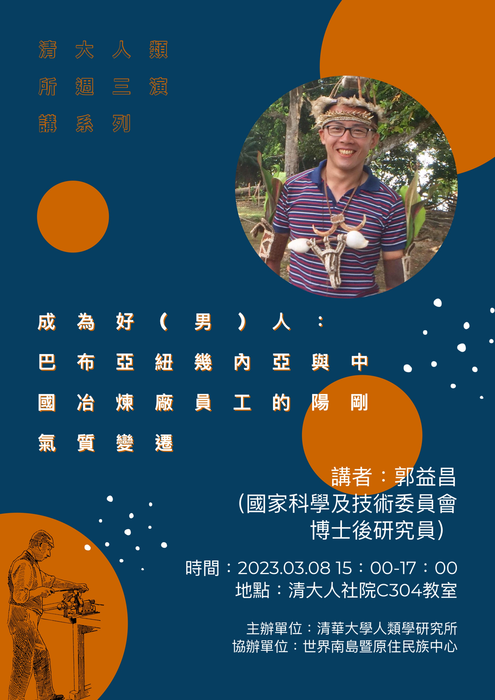Kamapim gutpela man: Papua New Guinean and Chinese refinery workers’ changing understandings of becoming a good man

Date: 2023/3/8
Time: 15:00~17:00
Location: HSS C304
Link: https://meet.google.com/upr-rpxp-ynf
This article adds to research on emerging masculinities in the Pacific by analysing how Papua New Guinean and Chinese male employees’ intercultural work experiences impact their perceptions of becoming a good man. The idea of a good man acts as a benchmark for assessing the adaptability of Papua New Guinean employees to new work environments and determining if Chinese colleagues are their desired partners. I illustrate this point by first considering becoming as an alternate framework to the binary framework reflected in earlier research. I next describe how Papua New Guinean workers impress their Chinese supervisors through negotiations and concessions about industrial and subsistence farming time, as well as how working with Papua New Guinean workers alters Chinese employees’ perceptions of work. Finally, I demonstrate how employment practices foster Papua New Guinean workers’ evolving perspectives on becoming a gutpela man (‘good man’) and Chinese employees’ evolving perspectives on becoming a good person, a vital route to becoming a chenggong man (‘successful man’). This article proposes characterising emerging masculinities as hybrid identities that are context-dependent, interculturally exchanged and temporal by presenting two parties’ new thoughts on becoming a good man. This article demonstrates modulatory power dynamics in the Chinese refinery based on a two-way narrative as opposed to portraying Chinese management as the dominating force.
Time: 15:00~17:00
Location: HSS C304
Link: https://meet.google.com/upr-rpxp-ynf
This article adds to research on emerging masculinities in the Pacific by analysing how Papua New Guinean and Chinese male employees’ intercultural work experiences impact their perceptions of becoming a good man. The idea of a good man acts as a benchmark for assessing the adaptability of Papua New Guinean employees to new work environments and determining if Chinese colleagues are their desired partners. I illustrate this point by first considering becoming as an alternate framework to the binary framework reflected in earlier research. I next describe how Papua New Guinean workers impress their Chinese supervisors through negotiations and concessions about industrial and subsistence farming time, as well as how working with Papua New Guinean workers alters Chinese employees’ perceptions of work. Finally, I demonstrate how employment practices foster Papua New Guinean workers’ evolving perspectives on becoming a gutpela man (‘good man’) and Chinese employees’ evolving perspectives on becoming a good person, a vital route to becoming a chenggong man (‘successful man’). This article proposes characterising emerging masculinities as hybrid identities that are context-dependent, interculturally exchanged and temporal by presenting two parties’ new thoughts on becoming a good man. This article demonstrates modulatory power dynamics in the Chinese refinery based on a two-way narrative as opposed to portraying Chinese management as the dominating force.
